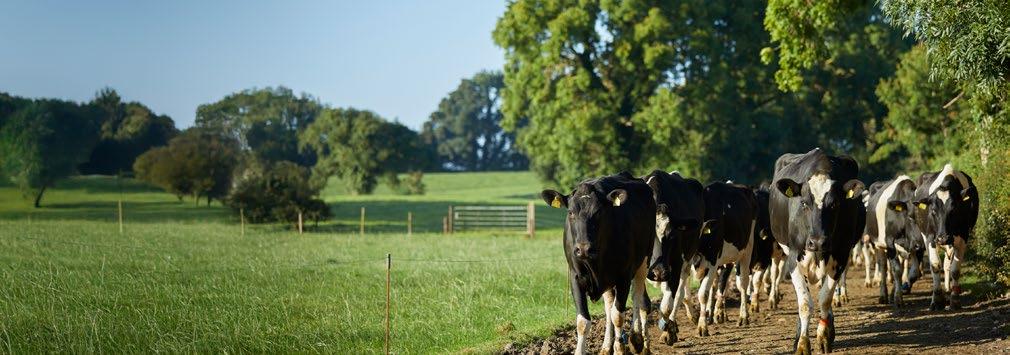

FARM FOCUS
Delivering a bright future for our young farmers
Dear Suppliers,
It is hard to believe we are already at the halfway point of 2025. The first six months of the year have seen both weather and prices combine to ensure strong volumes of milk were produced on farm.
Milk supply is up over 7% in the year to date compared with last year. The high volumes across the peak period were on a par with 2021.
Over 89 million litres from Tirlán suppliers were processed on site during our busiest week - there were record volumes processed and it is fantastic to see all of our sites fully utilised.
During the highest peak week in mid-May, our hauliers delivered over 3,360 loads, making over 15,950 collections from Tirlán suppliers or travelling the equivalent of 213 times around Ireland. Over the course of a single day, there were 481 loads delivered.
We’d like to thank all of our suppliers for your hard work on farm and your patience as we worked through the peak period alongside our hauliers and all our operators.
It was fantastic to have the opportunity to celebrate the high quality and standards on our farms at the Tirlán Dairy and Sustainability Awards. Congratulations to all our winners. Marketplace
Our high quality products and ingredients are sought after in over 100 markets worldwide.
Our teams are continuing to drive R&D in line with the growing global demand for protein. Our Solmiko and Promiko protein products continue to perform very well globally, especially in Europe and Asia.
We recently launched a new 10 litre Avonmore Professional cream bag-in-box format for our customers at Bakery China, Shanghai.
In the domestic market, our newly launched Avonmore Coffee Protein drink made with fresh milk and 100% arabica coffee beans has consistently increased orders over a short period of time. The innovation team are working on more new products and flavours for launch later in the year.
Our Agri business is continuing to perform strongly, with excellent uptake of our Milk Solids Growth Programme. Our revamped Tirlán FarmLife branches are attracting new customers, with solid feed and fertiliser sales, while footfall at our CountryLife Garden Centres continues to grow. Also, the reorganisation of our front-line team ensures that our people in the regions can put the customer at the heart of all we do.

Outlook
The market outlook for 2025 appears relatively stable, however, forecast returns are trending slightly below current milk prices. Ongoing uncertainty around international trade policy— particularly concerning U.S. tariffs—is contributing to volatility, while geopolitical tensions in the Middle East are also impacting global market confidence.
Sustainability & Nitrates Derogation
It is now six months to go to a decision on the retention of Ireland’s Nitrates Derogation post2026. Tirlán continues to advocate and highlight the importance of retaining a workable Nitrates Derogation for our grass-based family farm model. As we finalise this edition of Farm Focus, we are preparing to host a Farming for the Future event on economic performance, sustainable farming and protecting water quality on the farm of Seamus Brennan, in Attanagh, Co Laois. In July, our Chairperson, John Murphy is travelling to Brussels along with representatives from other Irish co-operatives to highlight the need for a continued focus on retaining the Derogation. Please continue to engage with our farm advisory services, and consider an application for the €60 million Farming for Water EIP.
Agri Climate Conference
At the recent Department of Agriculture’s Agriculture and Climate Change Science into Action conference, I had the opportunity on behalf of Tirlán to highlight the extraordinary progress within the sector and the excellent work our farmers are doing every single day to farm sustainably. Notwithstanding the current positive market dynamics, I also had the opportunity to reflect the very real challenges that our farmers and our co-operative is facing. The challenge of ensuring that the cost of sustainability is returned from the marketplace remains. As a sector, we will have to continue to engage with consumers to highlight that if they rightly want a product produced sustainably to the highest standards then it comes at a cost.
Generational Renewal
One of the major mounting issues facing this generation both in Ireland and internationally is ensuring that young people see their future in farming. Together, our industry and policy makers must ensure the next generation see a progressive, expanding industry with a bright future.
We must ensure that we do not arrive at a situation where as a nation and an industry we have delivered progress on the environment but endangered food security at a global level.
We must increase our investment in targeted research and new technology to assist and equip our farmers to farm sustainably and grow outputs on farm, rather than curtail them.
It is about balance. We must, of course, do the right thing by the environment and the climate challenge is real and impacting all in society, including our farmers. Yet, I would argue that Ireland also has a responsibility and is one of the best-placed countries to deliver sustainably produced dairy from a grass-based family farming model to meet the growing worldwide demand for proteins, along with high quality sustainable grain.
Farm Safely
During July, we will mark Farm Safety Week by supporting the vital work of Embrace FARM. Each year they provide core services for the families of those who have lost a loved one through farm injuries. With school holidays underway, we are urging everyone to be vigilant.
Please continue to farm safely,

Pictured with the Byrne family from Dungarvan, Co Waterford, who won the Tirlán Milk Supplier of the Year award, were Tirlán CEO Seán Molloy; John’s mother Mary Byrne; Mary and John Byrne; John’s father Eamon Byrne; Tirlán Chair John Murphy and Molly Byrne. Photo Finbarr O’Rourke
TIRLÁN DELIVERS STRONG PERFORMANCE IN 2024, REVENUE INCREASES TO €2.66BN
Tirlán published its Annual Report and Accounts for 2024 on 29 April 2025, reporting another strong performance, with a focus on innovation and winning new markets.
Key highlights include:
• Group revenue in 2024 of €2.66 billion, a 5% year-on-year increase, after navigating a challenging start to the year due to weather and commodity markets
• Delivered a strong performance with consistent EBITDA of €118.5 million to sustain, grow and develop the business
• Core net debt down €17m to €138m, the lowest level in over a decade
• Ireland’s largest milk processor with 3.028 billion milk pool and largest purchaser and user of Irish grains
• Over €1.5 billion paid to farm families for milk and grain, with improved market returns returned directly to Members
Total revenue for 2024 rose to €2.66 billion, a 5% increase compared to 2023, despite a challenging start to the year due to weather and global commodity markets. Tirlán delivered a strong and consistent performance, generating €118.5m EBITDA (Earnings before interest, tax, depreciation (net of grants), amortisation of goodwill and other intangibles and exceptional items) to sustain, grow and develop the business. Operating profit in 2024 remained consistent at €67.2 million, with improved market returns delivered directly to farm families through higher milk and grain prices.
Tirlán Chairperson John Murphy said the delivery of strong milk and grain prices and supports throughout a challenging year was a reflection of the Co-op’s financial strength and clear focus on its farm families.
“2024 was a year of two distinct halves for our Co-op and our Members. We supported our Members financially with a Member Support Package of €30 million offered in the face of significant weather challenges in the first half of the year that curtailed milk supply and resulted in the late sowing of crops. Dairy markets strengthened as the year progressed, with milk supplies finishing strongly and competitive prices for both milk and grain. Over €1.5 billion was paid out to farm families for milk and grain, demonstrating the importance of the agriculture sector as an indigenous Irish employer and driver of the rural economy.”
MARKETS UPDATE
In 2024, Tirlán processed a third of the Irish milk pool at 3.028 billion litres, and was the largest purchaser and user of Irish grains with its green grain intake reaching almost 179,000 tonnes. Milk supply made a strong recovery in the later months of 2024 to finish the year approximately 1% back on 2024 volumes.
Commenting on the 2024 results, Tirlán CEO Seán Molloy said the Coop delivered a strong performance in a challenging year, reflecting the agility and core strength of the business.
“We have invested in our Co-op over the past decade and our organisation today stands strong, with a robust balance sheet, wellinvested high-tech processing facilities, dedicated farm families and a talented workforce. Our success is down to every single member of our team working together to ensure our customers enjoy the best quality products as part of our customer-centric approach - be it on farm, in our facilities, collecting our milk or delivering it to doorsteps or shops. To ensure our continued success we prioritise ongoing investment in upskilling, education and embracing new technologies. After completing a significant cost reduction programme to proactively manage the cost base, we remain focused on delivering operational excellence and efficiencies every single day. We are well-positioned and a trusted partner to deliver on the growing demand for dairy and grains around the world.”
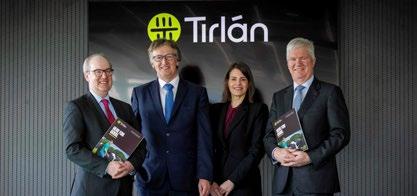
By Paula O’Dwyer, Senior Business Intelligence Manager Tirlán
Global dairy market fundamentals are relatively balanced but trade uncertainty remains very high
Concerns around a global trade war have eased with the wind down of the US-China punitive positions but could re-ignite at any time. The 90 day pause between US-EU remains in place on most additional reciprocal tariffs until mid-July 2025, or until they can reach a mutual trade agreement.
Dairy markets are diverged across the Northern Hemisphere with US commodity pricing the most competitively globally. European pricing is at a premium to the US situation but is dynamic against the peak seasonal pressure on liquids evident across the EU with a gradual easing of cheese prices in recent weeks.
US exports of cheese and butter to Mexico and Asia Pacific (ASPAC) were strong for the first Quarter due to competitive pricing versus Oceania and Europe.
US milk production growth is offsetting tighter supplies out of Europe and New Zealand
On a global basis, US milk production is offsetting lower than expected supplies out of Europe and New Zealand.
EU production has been lower than expected in Quarter 1 but has
improved in Quarter 2 2025. There continues to be downside risk in Europe with the re-emergence of Blue tongue virus expected.
The US has returned to growth and is expected to accelerate in Quarter 2 as increasing new US cheese capacity comes on-line.
The southern hemisphere is now in their low production season having performed well. Indications for the new 2025/26 season are reasonably positive.
The bearish risk to dairy markets is more on the demand side
The demand side may be impacted given sustained elevated prices at consumer level where prices increases continue to be passed on at retail level. The risk potential for weaker economic growth is high in the second half of 2025 across net dairy importers.
Chinese import demand has been improving in recent months against a low base. Milk flows in China are slowing down as the market there seeks to re-balance.
The uncertainty of the US tariff position with the EU and other trading bilateral trading partners is expected to continue over the coming months with the potential for supply chain disruption and higher costs.
To read more including the Annual Report 2024 please scan the QR code.
Bakery China
Our Avonmore Professional brand colleagues created a remarkable showcase at the 27th Bakery China in Shanghai recently. Avonmore is the number five imported cream brand in China. At the exhibition, Avonmore Professional launched a new 10 Litre Cream Bag-In-Box packaging format. This latest innovation not only enhances our product portfolio but also plays a crucial role in meeting the needs of the foodservice sector.
John Murphy met with the newly appointed Irish Ambassador Dr. Nicholas O'Brien and his team, and had the opportunity to thank them for all they do to promote Irish food in a key market.


Avonmore Protein Coffee
Avonmore Protein Coffee has gotten off to an exceptional start with full listings in retail stores nationwide. Feedback from retailers and consumers alike has been overwhelmingly positive, with all who have trialled the product saying just how good it tastes. The marketing support campaign which spans across outdoor media, instore advertising, social media advertising is in full swing. The brand will continue building awareness across June before coming back with a further heavyweight communications burst in September. The marketing team are confident of more volume to come as the product continues to build distribution, repeat sales, and grow awareness.

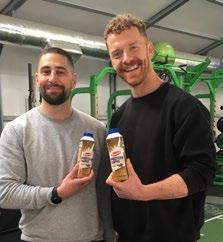
TIRLÁN HONOURS SUPPLIERS AT DAIRY & SUSTAINABILITY AWARDS
In April, we hosted our inaugural Dairy & Sustainability Awards at the Heritage Hotel, Killenard. It was a fantastic event, celebrating the exceptional dedication of 14 of our suppliers who provide top-quality milk in a sustainable manner.
We were also thrilled to present two Special Recognition awards: the Farm Employee Recognition award and the Milk Driver Recognition award. It was wonderful to celebrate the ‘unsung heroes’ who often work behind the scenes. Without their commitment and dedication, the day-to-day operations of Tirlán would not be possible.
The 2025 Milk Supplier of the Year award was presented to John and Mary Byrne from Coolnasmear, Co. Waterford, who also won our Milk Solids Champion award. The Byrne family exemplify what Irish family farming is all about. Check out the winner reveal video below—it was a joy to film and truly showcased why the Byrnes were deserving winners of the overall award.

Scan QR code to see the awards highlights

Scan QR code to see 2025 Tirlán Milk Supplier of the Year winners
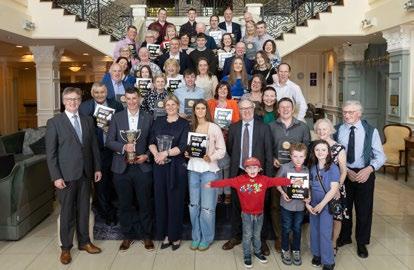
Tirlán Sustainability Champion
Alan and Cheryl Poole, Rose Bridge Farm Ltd, Ballyowen, Gorey, Co. Wexford
Farming for Water Champion Donal Kavanagh, Carrigeen Dairy Ltd, Baltinglass, Co. Wicklow
Milk Solids Champion John & Mary Byrne Ltd, Coolnasmear, Dungarvan, Co. Waterford
Avonmore Fresh Milk Supplier
Milk Quality Award –over 600,000l
Milk Quality Award –under 600,000l
John, Mona and Mark Finnegan, Balrath, Navan, Co. Meath
Graham Farms, Maguiresbridge, Fermanagh
Dermot, Angela & Noel Kehoe, Ballycullane, New Ross, Co. Wexford
North Region Award John & Sean McDonnell, Knockbridge, Dundalk, Co. Louth
East Region Award Sean Tracey, Tomhaggard, Co. Wexford
South Region Award John Kirwan Jnr, Butlerstown, Co. Waterford
West Region Award Jimmy & Sarah Morris, GlenGoole, Co. Tipperary
Young Farmer Award Martin O'Reilly, Killeshin, Co. Carlow
New Entrant Award
John Doyle, Ballygarret, Gorey, Co. Wexford
Farming Ambassador Brian Rohan, Mountrath, Portlaoise, Co. Laois
Cathal Moran Innovation Award
Farm Employee Recognition Award
Milk Driver Recognition Award
Bryan & Gail Daniels, Kilmoganny, Co. Kilkenny
Aidan O'Halloran, Tullow, Co. Carlow
Daniel O'Brien, from DJ O’Brien & Sons from Tallow, Co. Waterford
Final Call: Applications closing this week for the 2025 Sustainable Farming Academy
Are you interested in completing a 12 week fully-funded and mainly on-line University College Cork accredited Certificate in Sustainable Agriculture?
Delivered in partnership with University College Cork and supported by Baileys Irish Cream Liqueur, this fully-funded programme is a unique opportunity for 20 Tirlán suppliers to gain a recognised Certificate in Sustainable Agricultural Practice.
The course is structured to align with the farming calendar and focuses on the practical application of science-based insights across key areas such as climate action, soil health, water quality and biodiversity. It’s designed to equip participants with the knowledge and tools to improve both the economic resilience and environmental performance of their farm businesses with Co. Wicklow farmer and previous participant Anne Jennings, saying: "The opportunity to study has really opened my eyes and helped me to future-proof my farm by utilising soil samples and focusing on breeding, better grassland management and farm infrastructure. I’ve learned how to implement real changes on my farm, and I’m excited to continue this journey into the future.”
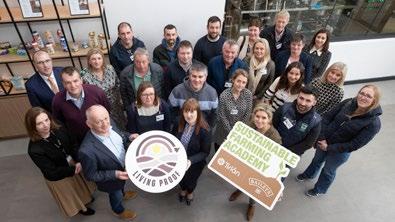

Don't miss your chance to be part of the programme. Scan the QR code and submit your Expression of Interest by June 27th
Sunshine and high spirits at the Balmoral Show
The Northern Ireland Milk Supply Team enjoyed a brilliant four days at the Balmoral Show, one of Northern Ireland’s main agricultural events, which takes place outside Belfast annually. The team was delighted to welcome a wide range of visitors to the stand, including valued farmer members, customers, and key stakeholders from across the agri-food sector.
A highlight of day one was the visit from Minister Andrew Muir, who engaged with the Tirlán team and talked about the co-op’s latest initiatives in sustainability, innovation, and farmer support. His visit underscores the importance of collaboration between government and industry in driving the future of agriculture.

Doran Family welcome Agri Aware’s Open Farm 2025
Agri Aware’s Open Farm 2025 was hosted by father-and-son duo Joe and Kevin Doran Dondale Farm in Donadea, Co. Kildare. The event spanned two days: a dedicated Schools Day on Thursday, June 12th, and a Family Day on Saturday, June 14th.
On Schools Day, primary school students from surrounding counties explored the dairy farm. Interactive stations provided insights into animal welfare, biodiversity, water quality, and the journey of food from farm to fork.
Saturday's Family Day offered attendees self-guided farm tours, live demonstrations—including milking and sheepdog herding—cooking showcases, and children's activities. Visitors also enjoyed tasting our Avonmore Mooju chocolate milk.
On the first day we also hosted members of our Council who explored the show and engaged with fellow Tirlán suppliers in the northern region.
The GAIN Pet Nutrition team also had a presence at this year's show to raise awareness of their super premium pet food range in a region where the brand is continuing to expand its profile.
John Murphy, Tirlán Chairperson, emphasised the significance of the show, stating, “Balmoral is a key opportunity to engage with our farmer members and celebrate the progress and potential within the dairy sector.”

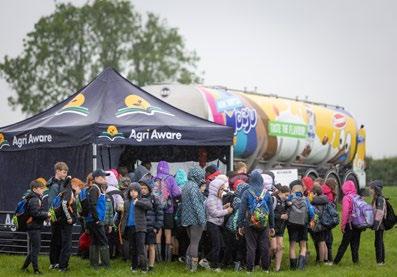
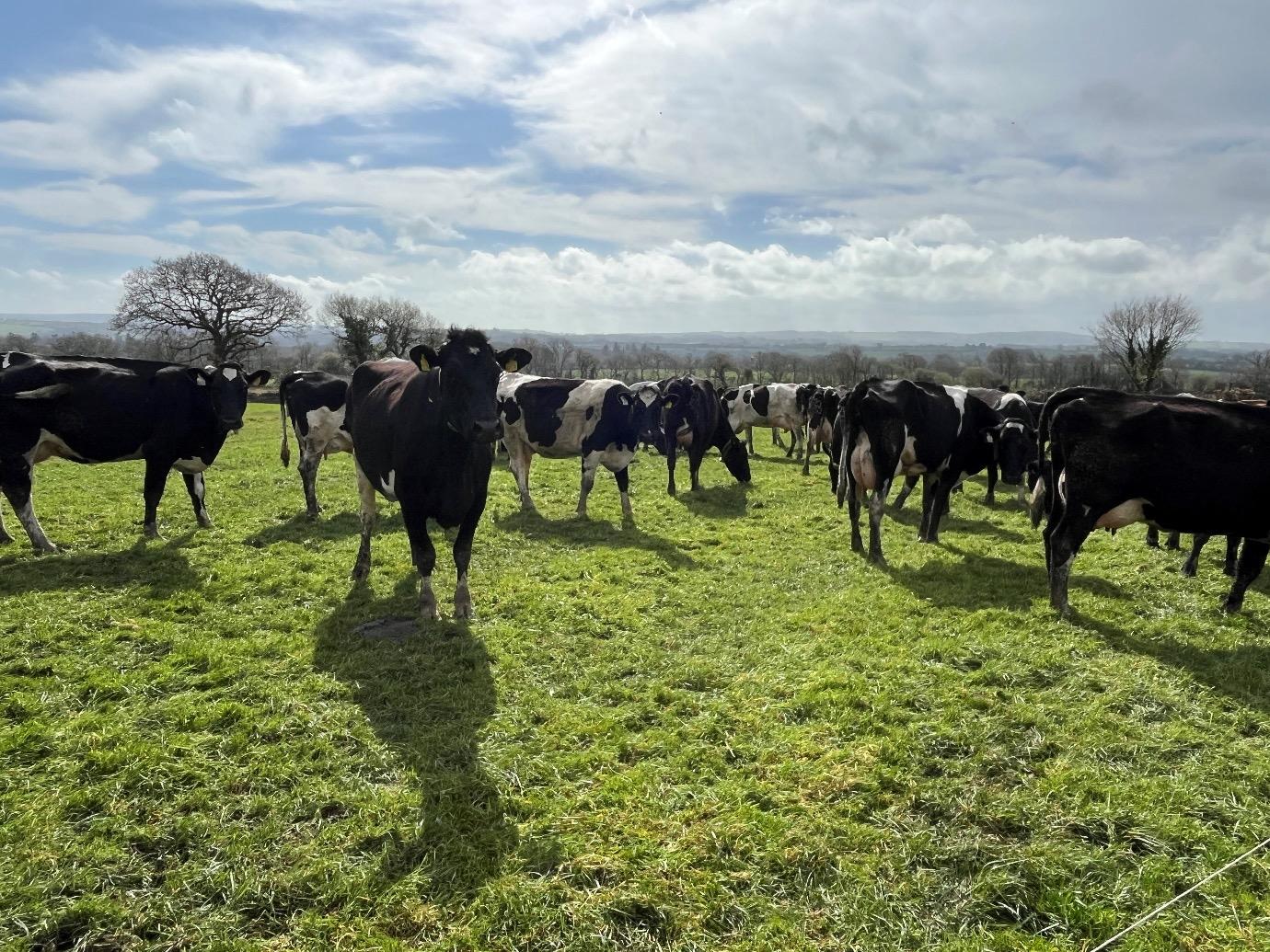
THE IMPORTANCE OF WALKING YOUR FARM THIS SUMMER
Sandra Hayes Co Ordinator of the Teagasc Tirlan Future Farms Programme
Grass is the cornerstone of our dairy farming system, and the quality of grass is a critical determinant of farm profitability and environmental sustainability. As Coordinator of the Teagasc Tirlan Future Farm Programme I play an essential role in supporting the monitor farmers through practical advice on improving their grass management. From my time as an advisor the most important thing anyone can do is to walk their paddocks. Whether you grass measure, crunch the figures etc, you have to start first with walking the farm! This is particularly important from the months of April/May onwards when grass growth hits it peak in line with spring calving herds peak milk production. The importance of grass quality for all farms will focus its impact on milk production, farm profitability, and environmental outcomes.
Our temperate climate, rich in rainfall and moderate in temperature, provides ideal conditions for grass growth. Grass is the primary feed for our dairy cows, making up to 80% of their diet during the grazing season. This reliance on grass for nutrition is a key factor that gives us our competitive advantage. High-quality grass provides the necessary nutrients, including energy, protein, and fibre, for cows to produce milk efficiently. Therefore, our need to focus on providing as much of this high quality feed as possible means walking the farm as much as we can. As an advisor I have seen grass quality change from excellent to poor in the matter of a few days, sometimes even quicker. The graph below shows us the 5 year average for national grass growth figures. As you can see there is a lot of ups and downs. As farmers it is those changes that have to be anticipated and planned for. Grass walking is one of the tools required and that helps in anticipating those changes.
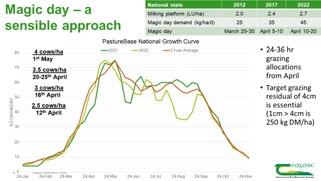
As well as walking the farm and assessing the grass quality we also need to know how much grass we have to supply to our herds in a 24/36 hour allocation period. We need to know the demand for grass for the herd. Striking a balance between the amount of grass grown and herd demand for that grass is the key to maximise productivity within grazing systems. Stocking rate (expressed as the number of livestock units (LU) per hectare (LU/ha)) has a major effect on the amount of grass harvested per hectare, levels of milk solids production per hectare and the overall productivity of the farm. If the stocking rate is too high then cows will be underfed and their production will be reduced. If the stocking rate is too low then grass is wasted because it is not eaten by the herd. If you are unsure about your stocking rate, or what demand of the herd is you should be contact your local Teagasc advisor or join a local Teagasc grass group. Each farm must assess from the grass grown over an average of a few years what is the best SR to be at for that farm. This will differ for every farm depending on SR, level of reseeding carried out, soil fertility, fertiliser programme, access to paddocks etc.
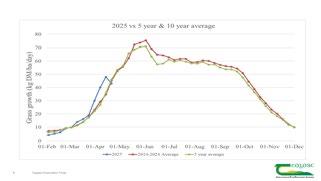
As I said before the more high quality grazed grass in the diet which supports high milk yields and overall cow performance the more

profitable the farm will be. This is supported by Teagasc research which indicates that grazing on well-managed pastures with high-quality grass can result in significant improvements in milk solids, which are a key measure of dairy farm profitability. Again for months from April onwards it is imperative that farms are walked to assess the amount of grass present and its quality. Below is a summary of the many benefits to grazed grass.
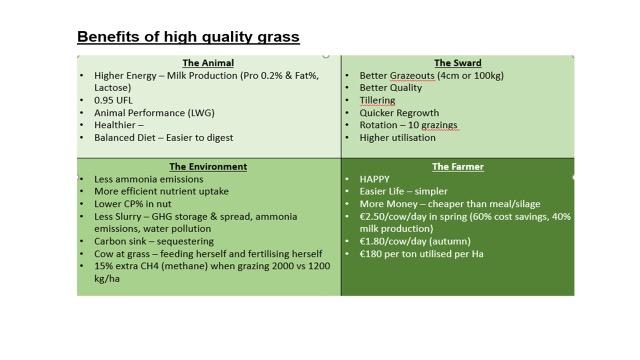
You can divide the farm into 3 sections. The first section is what is on the recent grazed paddocks, have they been grazed out well, have I spread fertiliser on them yet? Second section what has been grazed 1012 days ago? Are they at a cover of 600-800kgs DM/ha, i.e. over a hand fist of grass? If not, why are they not performing, could they be older grass swards, are there a lot of weeds or weed grasses present? Last section should be the paddocks that are very close to being grazed.
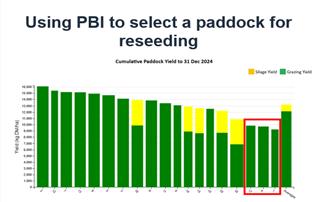
Are they at the correct cover, i.e. 1300-1400 kgsDM/ha? Are they at too high a cover, too strong? Have I enough grass to feed the herd for the next 7 days?
A lot of questions you may say and the answer is Yes! To help you answer these questions and to plan grass quantity and quality as well as possible I would encourage all farmers to use the grass measuring programme called Pasturebase Ireland. You can input all the information including stock numbers, meal fed, ground available, grass quantities and the programme will provide you with a weekly grass wedge ( given you walk the farm weekly!) and you can adjust this wedge to see where you maybe with grass in a weeks’ time. It gives farmers more confidence in taking out paddocks for surplus grass, identify poorly performing paddocks to reseed, predict forward if you think a slower or faster growth rate is coming next week. It gives you confidence to make more decisions with your grass. Grass measuring is a skill that develops over time. Mistakes will be made but learnings will be taken from it. If it not for you maybe there is someone else on the farm who would like to learn the skill. Contact your local Teagasc office or advisor for more information. You can also sign up for the weekly Teagasc Grass10 newsletter which provides all the update information you would need for managing grass, including rain and soil temperatures for the next week, weekly guidelines and notice of upcoming grass events in your area. Email grass10@teagasc.ie for more information.
Grass quality is a critical factor in the success of your dairy business. Optimise it to the best of your ability today by walking your farm as often as you can and see the difference it can make to you, your cows and your profits.
Cows from monitor farmers Larry & Jack Kearney grazing a 2024 reseed this April in the 2nd round
An example from Pasturebase in picking paddocks for reseeding
€2.1MILLION FARM FOR WATER EIP FUNDING FOR POSITIVE ON-FARM ACTION
Tirlán farm family suppliers with the support of their Agri-Sustainability Team are participating in increasing numbers in the Farming for Water EIP programme and availing of important funding sources to future proof their farms and reduce risks to water quality.
As part of this initiative, Tirlán works with our farm family suppliers in EPA identified priority catchments, to apply for funding from a menu of 43 actions. Common measures implemented under this initiative include the farmyard bucket and brush, Nitrogen surplus consultations, farmyard settlement tanks, vegetated bunded drains, willow filter beds, and slurry analysis.
Tirlán has been at the forefront of promoting sustainable farming practices through the Agricultural Sustainability Support and Advisory Programme and by incentivising dedicated water quality measures within the Sustainability Action Payment. In addition as part of this Farming for Water EIP, Tirlán has now become Ireland's leading co-op, proactively working with our farm family suppliers, submitting over €2.1 million in water quality remediation funding applications for its farm family suppliers. Tirlán continues to support our suppliers to address water quality challenges and their campaign to retain the Nitrates Derogation.
For more information please contact Farm Sustainability Advisor
Róisín McManus – (086) 2041446
LOCK IN YOUR 0.5CPL SUSTAINABILITY ACTION PAYMENT TODAY
Tirlán is asking all farm family suppliers to log-on to your Tirlán FarmLife account and declare the seven on-farm actions being implemented from the menu of 20 to continue to receive the 0.5cpl (including VAT) into next year.
New options in this year’s Programme include:
• Participation in Tirlán’s Milk Solids Growth Programme
• Use of AI Bulls with Genetic Resistance to TB
• Identifying Farm Nitrogen Balance Using AgNav
The top five actions declared by Tirlán Farm Family suppliers in recent years are:
• Use of Low Emissions Slurry Spreading equipment
• Improving herd EBI
• Herd disease screening
• Fencing off water courses
• Having a nutrient management plan in place
These positive actions by Tirlán Farm Family suppliers is making a difference, with improvements in water quality trends being reported and a 6.8% reduction in on-farm carbon footprint since 2018.

Now is the time to secure your 0.5cpl and declare your actions on Tirlán FarmLife
BORD BIA BLOOM POSTCARD GARDENS 2025
Tirlán CountryLife proudly showcased our continued support for Irish communities at Bord Bia Bloom 2025.
The highlight? Meeting hundreds of Tirlán CountryLife customers as they connected with our expert horticulturists, explored our vibrant display on local growing and biodiversity, and had great fun posing on the iconic Big Green Chair – a symbol of growth, collaboration, and community spirit.

The service users of Belcamp and Riverside Adult Day Service Centres, supported by St Michael's House in Dublin, brought their garden "Edible and Accessible" to life at this year's Postcard Gardens in Bloom.
As proud sponsors of these community gardens, Tirlán CountryLife Fiona Byrne, Tirlan CountryLife Marketing Manager and Kerrie Gardiner, Bord Bia Bloom's Show Gardens and Horticulture Content Manager joined the team, Emily Moorcroft and Ann O'Dwyer to celebrate their achievement with a certificate presentation from Bord Bia.

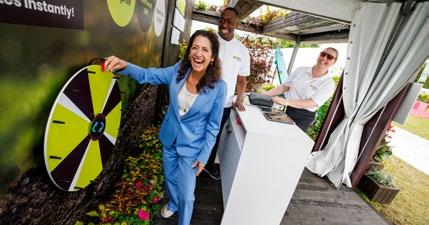
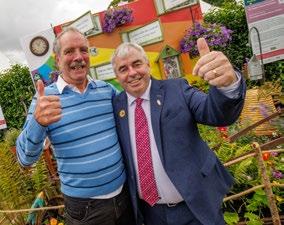


Tirlán CountryLife urges people to dig deep to support ‘Grow Yellow’ campaign for Aware
Tirlán CountryLife and our leading mental health charity, Aware, launched the ‘Grow Yellow – Brighter days ahead’ campaign to raise vital funds and highlight the benefits of gardening on mental health.
A vibrant yellow-blooming Osteospermum or African Daisy plants is available for a limited time in all 15 Tirlán CountryLife branches with €2 for every plant sold donated to support Aware’s support services.
As a dairy and grain co-operative, Chairperson John Murphy said Tirlán was proud to support a cause that impacts so many people and so many communities throughout the country.
“Mental health is one of the most important issues facing Ireland today, whether you are living in a rural area, a town or city, and maintaining it must be a national priority. We’re proud that our branches and our team of experienced horticulturalists can play our part in supporting the work of our charity partner Aware.”
In addition to raising vital funds, the campaign aims to highlight the important role Aware plays in Ireland today, as the national organisation supporting people impacted by depression, bipolar disorder, anxiety and related mood conditions. In 2024, Aware directly supported up to 40,000 people via its support and education services.
A visitor lends a hand planting up a garden box in aid of Aware, our mental health charity partner – a simple, meaningful moment in the heart of Bloom.
Well-known chef and Bord Bia Bloom favourite Edward Hayden stops by the Big Green Chair for a chat with the Tirlán CountryLife team –swapping stories about food, growing, and Irish gardens.
Minister Kevin “Boxer” Moran meets the Ballyfoyle Pastoral Group from Ballyfoyle, Co. Kilkenny, who proudly presented their garden “Turning Back Time in our Garden” at this year’s Postcard Gardens in Bloom. Pictured with Mick Brennan from the group.
The Bord Bia Bloom team bringing the buzz! Visitors to the Tirlán CountryLife stand had great fun spinning the prize wheel – with lots of garden goodies going home to proud winners.
Pictured at the launch of the Grow Yellow campaign in Tirlán CountryLife’s Monasterevin Branch were (LtoR) Tirlán Chief Marketing and Customer Experience Officer Ann Meaney; Tirlán Chair John Murphy; Tirlán Horticulturalist Eimear Delahunty and Aware Clinical Director Dr Susan Brannick. Photo: Finbarr O’Rourke
CONTROLLING BACTERIA IN MILK
Tips for preventing high bacteria counts (TBC & Thermoduric) in your milk this summer
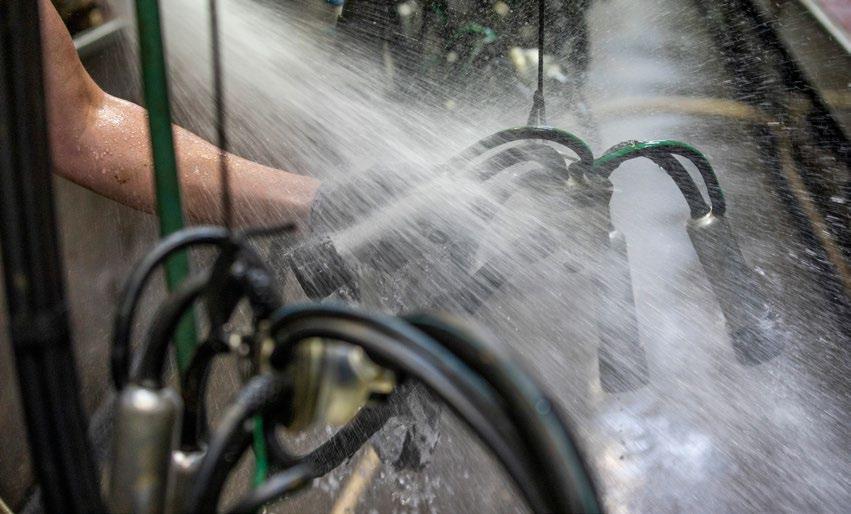
Machine & Bulk Tank Maintenance; as we reach the mid-point of the milking season is it the ideal time to assess and change worn rubberwear and liners. Ensure you bulk tanks condensing units have unrestricted air flow and any dust accumulations are removed – this is critical to prevent cooling breakdowns as temperatures rise during summer
The vacuum line can be a reservoir for Thermoduric bacteria and their spores. It should be inspected weekly as well as washed after every receiver jar breech (flood). It should be washed at least once per year as part of the milking machine service. If not washed correctly it has the potential to damage some expensive components. You should seek your technicians advice on vacuum line washing.
Only attach clusters to clean teats by ensuring good environmental management, cow cleanliness, parlour hygiene and teat preparation. If you have excessing numbers of cows presenting for milking below optimal cleanliness, assess why and take action
Choose a Detergent from Tirlán’s recommended range and follow the recommended wash protocol – if in doubt, seek advice from your local Milk Supply Manager
Incorporate Peracetic Acid as part of your wash routine; add to the final rinse water to help maintain a sterile environment within your milking equipment
Correct water volumes are required to clean the plant effectively. General guidelines are 9 litres per unit for the main wash and 14 litres per unit for the pre and post rinses, but will vary from farm to farm depending on equipment type. You must know the water volumes in order to apply to correct volume of detergent
Ensure the water is hot enough. Start at 85°C and dump at no less than 55°C. Use enough hot washes. This is dictated by the selected wash protocol. A warm pre-rinse (20°C and 30°C) before your main circulation wash is ideal for removing milk residues and maintaining temperatures in pipework before the main wash.
The availability of sufficient volumes of hot water can be a major limiting factor in wash routines on farms. Water heating is a large consumer of energy and is often done using inefficient and inconvenient electrical water heaters. This is why Tirlán have partnered with Flogas and Total Heating Ltd. to offer a more cost efficient and sustainable solution through On Demand LPG Water Heating – scan the below QR code for more details
The availability of sufficient volumes of hot water can be a major limiting factor in wash routines on farms. Water heating is a large consumer of energy and is often done using inefficient and inconvenient electrical water heaters. This is why Tirlán have partnered with Flogas and Total Heating Ltd. to offer a more cost efficient and sustainable solution through On Demand LPG Water Heating – scan the QR code for more details.


Switching to Flogas
HOW TO PREVENT SUMMER SCOUR SYNDROME
By Joris Somers, Tirlán Veterinarian
Summer Scour Syndrome is more common in calves grazing 'rich' or 'lush' pastures, typically with a high crude protein (greater than 20%) and low fibre (less than 40%) content per kg of dry matter ingested.
Summer Scour Syndrome (SSS) is a relatively new condition and research is ongoing to determine the exact cause. Lack of rumen development before turn-out may play a part in SSS. Multiple theories exist as to what the most likely risk factors are. The one common factor to all cases is a grazing diet (exclusively or partially) in first grazing season calves. Characteristic scour and rapid weight loss typically occurs in dairy calves within a month after turn-out and up to 12 months of age.
Other signs of SSS include lethargy, weakness and lack of rumination, which can progress to profound weakness and death. Some calves may develop mouth or muzzle ulcers. Not all calves in the group are affected and severity can vary from year to year and farm to farm.
The affected calves are usually unresponsive to conventional treatments, only responding to removal from grass. The common infections or parasites of calves at grass don’t seem to be associated and the disease is thought to relate to nutritional issues, such as a rumen insufficiently developed to digest forage.

SSS is more common in calves grazing 'rich' or 'lush' pastures, typically with a high crude protein (greater than 20%) and low fibre (less than 40%) content per kg of dry matter ingested. Calves are selective grazers and preferentially consume the top, leafier parts of the grass, which contain more nitrates and non-protein nitrogen (NPN). It is suspected that consumption of large quantities of nitrates and NPN by young calves, with immature rumen development might lead to an excessive build-up of ammonia in the rumen.
Inadequate rumen development may also lead to an unstable pH for rumen microbes to function appropriately which may also potentially contribute to the syndrome.

Get feedback on your calf rearing process
Discuss with your vet and farm advisors if your calf rearing is optimal. It may be appropriate to delay weaning to at least 10 weeks of age for example.
Wean calves gradually Gradual weaning ensures a smooth transition from a milk diet to a forage diet, concentrates should be introduced to calves from the first week in life.
Begin weaning up to 4 weeks before removing milk completely and calves should be eating at least 1kg of concentrate daily consistently before weaning.
Ask about the GAIN Heifer Rearing Programme for more detail.
When weaning, make no other dietary changes
Other dietary changes will increase stress and take longer for the calf to adjust.
Depending on the farm facilities and the type of grazing available, it might be worthwhile to consider retaining calves indoors on a concentrate and high fibre diet for at least 1 week after weaning before turn-out.
Ensure calves have high levels of fibre in the diet when first turned out.
Calves need adequate levels of fibre. This can come from grazing more stemmy grass covers or providing an additional fibre source (straw or hay).
Avoid calves grazing newly reseeded pastures, or paddocks with very leafy (lush) grass for at least 2 months after turn-out.
Strip graze calves to encourage consumption of both leaf and stem.
Avoid pastures that have had slurry or nitrogen applied recently.
Calves may prefer more lush grass but may not be able to digest large amounts of it.
Slower growing pastures have less nitrogen and more fibre.
TIRLÁN TB SUPPORT PROGRAMME
In response to the rise in TB cases nationally and based on direct feedback from our farmer representatives, we are pleased to introduce the Tirlán TB Support Programme. This €5 million voluntary initiative offers an optional advance on future milk payments to eligible suppliers affected by a TB breakdown between 1 January 2025 and 31 December 2026.
Under the programme, qualifying Tirlán milk supplying coop members who lose more than 5% of their dairy cows or in-calf heifers due to TB will be eligible to apply for a pre-payment of future milk supplies equal to €750 per animal lost. This support will help ease immediate cashflow pressures and will supplement State supports under the national Bovine TB Eradication Scheme.
In the case of New Entrants to dairy farming, the programme is available regardless of the percentage of the herd impacted, with eligibility based on start date of milk production.
This is an interest-free advance on future milk payments which will be deducted, two years after the pre-payment is issued, from milk payments equally across seven months in each of two years (e.g. April–October milk payments in 2027 and 2028 for herds impacted in 2025). The maximum pre-payment available per participating herd is €50,000.
Closing date for receipt of applications is 31 December 2026 or earlier if the total €5 million fund available is advanced to Suppliers.
If you would like more information on the Tirlán TB Support Programme, please contact your Milk Supply Manager.
HOW TO PREVENT SUMMER SCOUR SYNDROME:
LOOKING TO MAXIMISE MILK SOLIDS THIS SUMMER?
Getting expert advice on grass quality and pre-grazing yields can make all the difference.
Accurate grass management plays a key role in driving milk solids production during the crucial summer months. Make sure you're getting it right!
Get in touch today with your local Milk Solids Growth Specialist.
Seamus Millea Milk Solids Growth Specialist - West 086 817 3958 semillea@tirlan.ie Edward Healy Milk Solids Growth Specialist - East Region 086 824 1695 edhealy@tirlan.ie
Available to all Tirlán milk suppliers via TirlanFarmlife.com, this innovative online tool makes it simple to monitor and manage your milk solids performance.
The Milk Solids Growth Tracker provides real-time data, offering insights into herd performance compared to previous years and supplier-set targets. It quickly identifies when targets are not being met, allowing for timely corrective actions.
To access the tracker, log in to the “My Account” area and click on the “My Farm” section.
Start tracking today! Scan
to set up your Milk Solids Tracker.

Cows showing signs of ‘pica’ on your farm?
By Joris Somers
While pica is typically caused by phosphorus deficiency or linked with low sodium levels, where cows are receiving adequate phosphorus supplementation in the diet, symptoms that are seen at this time of year are more likely to be secondary to a low dietary fibre in the cow’s diet. Low fibre inclusions in the diet will lead to:
• Loose faeces
• Reduced ‘cudding’, and therefore saliva production (leading to ruminal acidosis due to reduced buffering from saliva)
• Reduced milk fat output
Reduced overall feed intake and subsequent reduced milk production
This is often seen during a period of time where cows are offered low covers of lush grass, low in fibre content or during a period of rapid grass growth, which occurs once rainfall deficits recover. A secondary phosphorus deficiency can also be caused by the increased sugars present in high quality covers of grass, typically seen after a period of restricted growth.
To prevent/correct the problem, ensure that cows have access to a source of long fibre such as a bale of straw or stemmy silage/ haylage in the paddock, at the feed barrier or near the collecting yard.
One of the tell tails of pica is increased foraging/licking by cows. As a result of this foraging, cows can come across toxic plants and foreign inedible objects such as nails, wires and discarded car batteries. Be vigilant to watch out for car batteries that animals could get access to on farm. Pay particular attention when cows are going out to paddocks that are normally not grazed by cattle such as silage ground and check hedges and ditches for discarded batteries and pieces of metal. Lead poisoning symptoms show rapidly and animals go down quickly. Recycle and remove all batteries off farm.
Notify your Milk Supply Manager immediately if you or your farm vet suspects that your cows may have been exposed to lead.

DATE
Tuesday 24 June 2025
Thursday 26 June 2025
Wednesday 2 July 2025
Thursday 3 July 2025
Wednesday 9 July 2025
Thursday 10 July 2025
Wednesday 16 July 2025
Thursday 17 July 2025
Wednesday 23 July 2025
Thursday 24 July 2025
Wednesday 30 July 2025
Thursday 31 July 2025
BRANCH
Kilmeaden CountryLife, X91 PX45
Monasterevin CountryLife, W34 PF50
Castlelyons CountryLife, P61 K156
Goresbridge FarmLife, R95 C563
Ashford CountryLife, A67 R791
Fethard Countrylife, E91 E5C1
New Ross CountryLife, Y34 PF61
Castlecomer CountryLife, R95 KD35
Dungarvan CountryLife, X35 KA99
Athboy CountryLife, C15 HE33
Ballyhale CountryLife, R95 D1HC
Bunclody CountryLife, Y21 YN15
RESEEDING: A SUSTAINABLE PATH TO PROFITABILITY AND FARM RESILIENCE
For dairy farmer Brendan Sheridan, grass is the foundation of his farm’s success. By regularly reseeding, he is boosting grass growth, improving soil health, and reducing his reliance on imported feedkey factors in running a profitable and resilient system.
From Dungarvan, Co. Waterford, Brendan aims to reseed 15% of his grazing platform annually, with the goal of having the whole farm reseeded in seven years. The long-term benefits of this approach are clear: increased grass growth, better grazing utilisation, and greater resilience against weather and economic pressures.
Milking 150 Holstein cows on a 52 hectare platform, efficient grassland production and management is a priority.
His strategic reseeding plan ensures that his farm continues to deliver high-quality forage, providing better animal nutrition and financial security.
Grass Growth
Soil sampling is carried out across the whole farm every second year, and this is referenced when making decisions about reseeding and slurry and fertiliser applications.
“We reseed a minimum of 10% every year, but going forward we will be looking at doing 15%. We find that we get a better response from fertiliser on reseeded ground.”
Expert Advice
With careful planning and expert guidance, from Tirlán FarmLife Business Development Manager Paul McKevitt, Brendan has developed a structured approach to reseeding that maximises results.
“Paul goes through things with me - he recommends grass mixes and advises me on management. The last few years we have gone with Tirlán’s Premium Sward mix, it has worked really well and I’m happy with its performance.”
Reseeding Strategy
Young stock are outwintered on kale. It is sown in June and reseeded the following spring, around mid-April. Brendan admitted that “there is a bit of work involved, but it works well, and the cattle do well on it”.
In terms of field preparation, slurry is spread just before the field is ploughed.
“The ploughing is done by a contractor, and we do the rest ourselves. The field gets two runs of the power harrow, and then the seed is sown. It is rolled straight away. The job is done in two days. I spray with a cover safe spray about a month later, it has worked very well.
“The last two years haven’t been great for reseeding; seed was late going in and didn’t get a great start. There wasn’t much on it for the first grazing, and we were trying to mind it. I try to get a good grazing after six weeks.”
Silage ground is closed off six weeks before being cut and two cuts are taken every year. The ground is reseeded every five years.
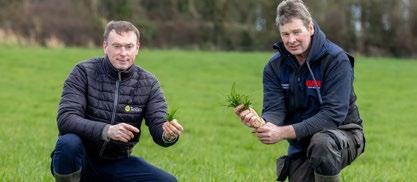
Red Clover Silage
In addition to conventional reseeding, Brendan has also experimented with red clover to enhance forage quality and improve herd performance. Last year, he sowed eight acres of red clover into a field.
“Last year was a poor year for clover, we only got two cuts from it last year, we hope to get four this year,” he said. We gave it to them in November as buffer feed to stretch the grass and we are feeding bales of it at the moment by night. It feeds well as silage; the cows like it and perform well on it.”
Productivity Gains
“Reseeding increases the productivity of the sward,” Brendan finds. The year you reseed it, it could be out of the rotation for six or seven weeks, but it will still outperform the worst paddock.
You notice the paddocks go further; they grow more grass – you might get 10 grazing’s out of a paddock instead of eight. A reseeded paddock grows nearly two tonne more dry matter than the older paddock, there is no comparison. We use less Nitrogen because the response is much better- less is needed and more is grown.”
Building Farm Resilience
“Imported feed is expensive, so by reseeding, we are giving ourselves the best chance of growing as much grass as we can,” he said.
Maximising homegrown forage means that Brendan is reducing input costs, improving profitability, and making his system more financially sustainable.
In addition, reseeding contributes to better soil health, improved nutrient efficiency, and reduced environmental impact.
Through reseeding, Brendan is enhancing grass quality, increasing grazing days, and improving overall farm efficiency, and is creating a more resilient, productive system that will sustain his herd for years to come.
For more information on Tirlán Mastercrop grass seed mixtures, please contact your local Tirlán FarmLife branch, business manager or visit TirlánFarmLife.com.
TIRLÁN CO-OP AND OUR MEMBERS INVESTING IN A SUSTAINABLE FUTURE
Negative headlines can often drown out the great agri sustainability actions by Tirlán and our farm families. Here we take a look at some of the key numbers.
6.8% 94% 21%
Tirlán’s on-farm CO2 emissions reduction since 2018.
Percentage of Tirlán Farm Family Suppliers that undertook soil testing in 2024.
Increase in the use of protected urea by Tirlán Farm Family suppliers since 2021. This is the most significant action identified by Teagasc to reduce on-farm carbon footprint.
Annual fund available to Tirlán farm family suppliers, as part of the voluntary Sustainability Action Payment. 91% €16m
Percentage of Tirlán Farm Family Suppliers that used LESS equipment when spreading slurry in 2024, up 79% compared to 2017.
Photo: Brendan Sheridan milks 150 cows on his farm in Dungarvan, Co Waterford, and aims to reseed 15% of his farm each year.

FARMGEN – POWERING YOUR FARM WITH RENEWABLE ENERGY
FarmGen is Tirlán’s Industry Leading Solar Energy Solution, purpose built for Irish farms. Delivered in partnership with PV Generation, renowned experts in high performance Solar PV systems. FarmGen combines reliability, innovation and future proofed energy systems supported by market leading warranties.
Whether you operate a dairy, beef, tillage, or mixed enterprise, FarmGen provides a bespoke solution tailored to your farm’s unique energy needs. With Smart Monitoring technology, you can track energy production and consumption in real time, helping you maximise efficiency and lower your operating costs.
Assisted by the Department of Agriculture’s TAMS 3 scheme, eligible farmers can access up to 60% grant funding to support your investment in Solar PV and Battery Storage. FarmGen simplifies the process by managing both your grant and ESB applications from start to finish – letting you stay focused on what matters most - your farm.
Farm Families across the country are already seeing the results: lower energy bills, reduced emissions and freedom from fluctuating energy prices. With the backing of Tirlán’s local teams and ongoing customer support FarmGen is more than just an energy solution it’s an investment in your farms long term sustainability journey.
Join the growing number of Tirlán farmers switching to renewable energy. Choose FarmGen - an investment in your farm’s future, supported by trusted expertise, innovation, and local service.
Get a Quote Today!
Scan the QR code below and a member of our team will be in touch, or contact your local Tirlán Representative for more information.
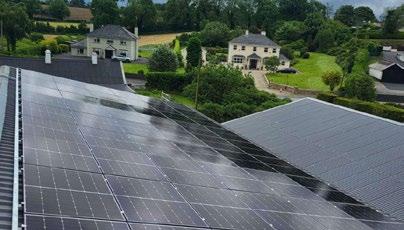

If you have an idea, suggestion or any feedback on Tirlán Farm Focus please contact: Corporate Affairs Department, Tirlán, Abbey Quarter, Kilkenny, R95 DXR1 T: 056 779 6300 or email corporatecomms@tirlan.com
